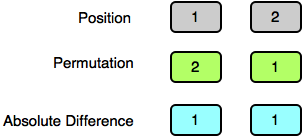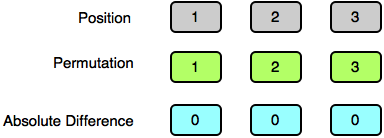Absolute Permutaton - Hackerrank Problem Solution
Absolute Permutaton
Hackerrank Problem Solution
We define to be a permutation of the first natural numbers in the range . Let denote the value at position in permutation using -based indexing.
is considered to be an absolute permutation if holds true for every .
Given and , print the lexicographically smallest absolute permutation . If no absolute permutation exists, print -1.
For example, let giving us an array . If we use based indexing, create a permutation where every . If , we could rearrange them to :
pos[i] i |Difference|
3 1 2
4 2 2
1 3 2
2 4 2
Function Description
Complete the absolutePermutation function in the editor below. It should return an integer that represents the smallest lexicographically smallest permutation, or if there is none.
absolutePermutation has the following parameter(s):
- n: the upper bound of natural numbers to consider, inclusive
- k: the integer difference between each element and its index
Input Format
The first line contains an integer , the number of test cases.
Each of the next lines contains space-separated integers, and .
Constraints
Output Format
On a new line for each test case, print the lexicographically smallest absolute permutation. If no absolute permutation exists, print -1.
Sample Input
3
2 1
3 0
3 2
Sample Output
2 1
1 2 3
-1
Explanation
Test Case 0:

Test Case 1:

Test Case 2:
No absolute permutation exists, so we print -1 on a new line.
.
CODE TOGETHER..GROW TOGETHER.

Comments